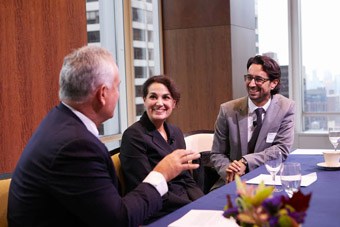Commitment During Crisis
Commitment During Crisis

Dedicated staff of The Fedcap Group are taking extraordinary steps to continue to assist those we serve as the nation struggles to contain the coronavirus pandemic. In the face of increasing hardship and a dearth of resources and support, our people are stepping up.
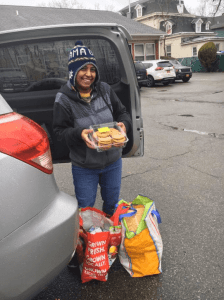 Easterseals New York’s Project Discovery is an integrated educational program for preschoolers that includes special education services, as well as an Outreach Program, providing food, clothing, housewares and toys to the neediest residents of Port Jervis. Over 165,000 pounds of food are distributed annually to children and families in need.
Easterseals New York’s Project Discovery is an integrated educational program for preschoolers that includes special education services, as well as an Outreach Program, providing food, clothing, housewares and toys to the neediest residents of Port Jervis. Over 165,000 pounds of food are distributed annually to children and families in need.
Each morning bread, produce and other items are displayed on a table in the parking lot for residents to pick up as needed, to supplement the food distributed at monthly outreach events.
“Recently, instead of receiving over 1,200 pounds of bread a month, we are getting five loaves. It’s getting quite serious here,” said Barbara Kuczyra, Outreach Coordinator and School Nurse for Project Discovery.
Our Total Facilities Management teams are out in full force working 24/7 to clean and sanitize facilities throughout New York, Boston, Virginia and Delaware. “The demand is significant and we are hiring new staff to meet the needs, all the while ensuring the safety of our dedicated staff,” says Steve Coons, President of Fedcap Rehabilitation.
In addition, our residential care workers and home health aides are providing direct care to some of society’s most vulnerable.
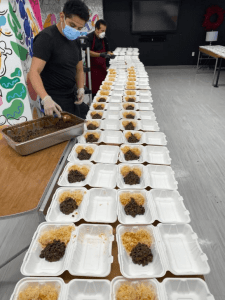 The Fedcap Group’s Food Arts Center is working 24/7 to address food insecurity among people impacted by the COVID-19 pandemic. Partnering with Migrant Kitchen, the Food Arts Center is producing over 1000 meals per day, providing free meals to healthcare workers and their families, including frontline workers at the Covid-19 treatment units at Bellevue Hospital Center, Lenox Hill Hospital, and Memorial Sloan Kettering.
The Fedcap Group’s Food Arts Center is working 24/7 to address food insecurity among people impacted by the COVID-19 pandemic. Partnering with Migrant Kitchen, the Food Arts Center is producing over 1000 meals per day, providing free meals to healthcare workers and their families, including frontline workers at the Covid-19 treatment units at Bellevue Hospital Center, Lenox Hill Hospital, and Memorial Sloan Kettering.
In addition, the Food Arts Center has been hosting Feed the People, which is producing and delivering emergency meals to families and individuals who are housebound or have food security issues.
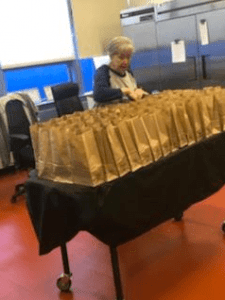 The Fedcap School in Orange, New Jersey closed on March 18th as part of a statewide effort to contain the coronavirus. Social Workers, Counselors and Job Coaches are making wellness check-in daily calls and are available to any student in need. Staff are delivering breakfast and lunches to the entire student population.
The Fedcap School in Orange, New Jersey closed on March 18th as part of a statewide effort to contain the coronavirus. Social Workers, Counselors and Job Coaches are making wellness check-in daily calls and are available to any student in need. Staff are delivering breakfast and lunches to the entire student population.
The mood around the Fedcap School Staff is “unified and strong,” said Principal Luanne Macri. “We are teachers. We care about our students, and our population depends on us for far more than educational achievement. This is uncharted territory for everyone, but we are in this together, and we will be there for our students.”
Easterseals New York is on the front line providing child care services to our first responders and health care providers.
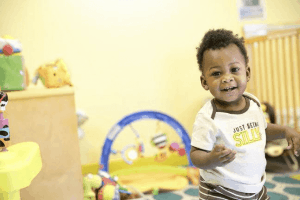 “I am so proud that our Easterseals staff are stepping up and ensuring the availability of child care during this time of crisis”, said Don Harreld, Executive Director of Easterseals New York.
“I am so proud that our Easterseals staff are stepping up and ensuring the availability of child care during this time of crisis”, said Don Harreld, Executive Director of Easterseals New York.
Our Fedcap Inc. team is working around the clock to stand-up a new service delivery system in Canada (www.fedcapcanada.org), some staff getting stranded there for weeks at a time.
Share on
Recent Posts
Saving Promotes Aspirational Thinking
Saving Promotes Aspirational Thinking

I grew up with the concept that each generation would be more successful than the generation before. “Successful” means achieving more, learning more, earning more, and contributing more to society.
Here’s what we know:
For the first time in many generations, young people are not entering or succeeding in post-secondary education as successfully as the previous generation. This fact is a pivot point that, if mitigated, could change the trajectory of poverty in this country.
Even as many in our millennial generation eschews higher education for entrepreneurship, the fact still remains that a college degree translates into higher earning power. For those living in low-income households, attaining a college degree is particularly challenging. Often parents in these households have themselves not attended college, so there is no assumption or expectation that a child would go. In addition, the expense of college often proves to be too big a burden for a household struggling to make ends meet. For these households, a financial emergency—even one as low as $400—a broken car, for example, could upset a balanced budget and in dire circumstances—a true reality for many—be the difference between living in a home and being homeless. In these cases, college expense is an unaffordable luxury.
But here’s what else we know:
If a child has anywhere from $1-$499 set aside in a savings account, she or he is three times more likely to attend college. And that same young person is four times more likely to graduate from college. If the savings account is specifically earmarked for college those statistics are even higher: children are four times more likely to attend college and six times more likely to graduate.
At Fedcap, we are continually looking at precise interventions that will interfere with the trajectory of economic instability. For example, we created PrepNOW!™ and Get Ready!™ specifically to disrupt the assumption that young people in low-income families could not attend college, graduate and compete in high level successful careers. PrepNOW!™ was designed to help parents –including foster parents—create a college-going environment in a household where college may not have been an assumption or expectation. These interactive web based courses, facilitated by a success coach—help raise awareness and offers specific tools to support young people as they apply and enter college, persist and graduate. Get Ready!™ helps prepare young people ready for post-secondary education and career success by understanding the foundational skills necessary to present themselves, to communicate, and to aspire for goals previously considered unattainable. These programs have proven to be wildly successful, and I am happy to report, are being replicated throughout the country.
These innovations, along with those that create strategies for young people to set aside monies for college from the earliest ages, are how transformation happens. Setting expectations that a child will go to college is a well-researched predictor of her application and matriculation. Filtering these assumptions and expectations into all of our systems—early education providers, K-12 schools, libraries, community centers, healthcare centers, houses of worship, the workplace—and backing awareness with easy-to-access programs—is one way we can alter the trajectory of poverty.
Putting these innovations in place is how we ensure relevant, sustainable impact and it is how we ensure that the power of possible is manifested as concrete, attainable step to economic well-being.
I welcome your thoughts.
Consolidated Financial Statements and Report of Independent Certified Public Accountants September 30 2016 and 2017
Type name here
Designation here
“Type Quotes Here”
“Type Quotes Here”
“The Fedcap Group is exceptional for the remarkable combination of smart ideas, management efficiency and idealistic commitment that it brings to everything it does.”
Richard Fursland, CBE
Secretary
“The Fedcap Group is exceptional for the remarkable combination of smart ideas, management efficiency and idealistic commitment that it brings to everything it does.”
“The Fedcap Group is exceptional for the remarkable combination of smart ideas, management efficiency and idealistic commitment that it brings to everything it does.”
“The Fedcap Group is exceptional for the remarkable combination of smart ideas, management efficiency and idealistic commitment that it brings to everything it does.”
Richard Fursland, CBE
Secretary
Richard is a Director of BritishAmerican Business and The Fedcap Group; Chairman of the Business Advisory Council of the NY Public Library for the Performing Arts; and a docent with the Wildlife Conservation Society.
Previously, he was a Co-Founder and the CEO of BritishAmerican Business (2000-2015); COO of the International Peace Academy; EVP at Grey Advertising; and a British diplomat, serving in Hong Kong, Beijing and London, and at United Nations/NY.
He graduated from Cambridge and had a Fellowship at Harvard; and received a CBE from HM Queen Elizabeth II for his services to British business. He is married to MJ Territo, a jazz vocalist/lyricist and music educator, sharing one daughter.
He has lived in New York since 1981, but remains an avid fan of West Ham, Private Eye and Marmite.
Solution Series
Solution Series
In 2011, The Fedcap Group launched its first Solution Series addressing the employment of soldiers returning from war. Since that time, we have explored issues such as Cost/Benefits of Increasing Minimum Wage, Impact of Immigration on Business; Employment of the Previously Incarcerated; Leveraging the Talents of Older Workers as a Competitive Advantage; The Intersection of Economic and Workforce Development; Mental Illness and Addiction in the Workplace and many other critical issues of our times.
The format for the Solutions Series includes a moderated discussion by a panel of experts and Q&A from the audience.
Panelists have included nationally recognized individuals such as Congressman Patrick Kennedy; Luis Tejada-Vice President of Goya Foods; Shay Bilchik, Director of the Center for Juvenile Justice Reform at Georgetown University; Michael Weinstein, Economist and CEO of Impact Matters; Anna Oliveria, President of the New York Women’s Foundation; Jim Salazar, President of Clark Shoes; Doug Rausch, President of Trader Joes; staff from the US Chamber of Commerce; Commissioners of Child Welfare, DOL and Education; and many more.
While we do not expect to “solve” issues through our Solution Series, we do intend to begin substantive community conversations, and encourage panelists and audience participants to provide perspectives, insights and ideas around potential solutions to challenging business realities.
Beyond the Stigma: Mom, son share story of recovery
By his own account, Chris Sprague had a happy childhood. He grew up in a good home and vowed that he would never drink or take drugs. Then his father died and Sprague fell in with friends who did both. By the time he was in his mid-20s, he was addicted to opioids and had lost everything he held dear.
Hello world!
Welcome to WordPress. This is your first post. Edit or delete it, then start writing!
Leadership
Leadership
Last week, we held a Leadership Forum for staff from across our growing family of agencies. In it, we started planning for 2025, explored trends in the nonprofit marketplace, in human resources, in technology, in government funding and we identified strategic directions. We then identified the DNA of leaders required to effectively advance us toward our goals.
Included in that DNA are vision and the ability to operationalize that vision, integrity, influence, analytical skills, compassion, resilience, and the skills required to drive change. AND in addition, we discussed two traits absolutely critical to leadership: the willingness to stand for something and the ability to take bold, yet calculated, risks.
I’ve heard many leaders pay lip service to the idea that they want their “followers” to disagree with them. However, what I’ve discovered in my career is that while many say that this is what they want, in actuality, they want to have the people they lead follow them by operationalizing their vision. There’s absolutely nothing wrong with that, but frankly, I prefer people who really will disagree with me. I want to be shown a better way, invited to a wider vision. I want to engage in discussions where staff share perspectives different from my own. I want to work with people who have different backgrounds, experiences, and expertise. I want the people I work with to be here because they stand for something and because they will be fierce in standing for what they believe.
It is in this diversity of perspectives that we are truly better together.
Besides leaders who stand for what they believe, we also need leaders who are able to see the ways the environment is rapidly changing and are able to call forward the next “thing.” We need people who can understand the environment enough to take smart, planned risks— understanding that without some degree of risk there is no future. We need leaders who are students of their profession, who never stop learning and as such, the risks they take are based on knowledge, wisdom and instinct.
What do you stand for? What risks do you take in your organization? What is the DNA of your leadership?


